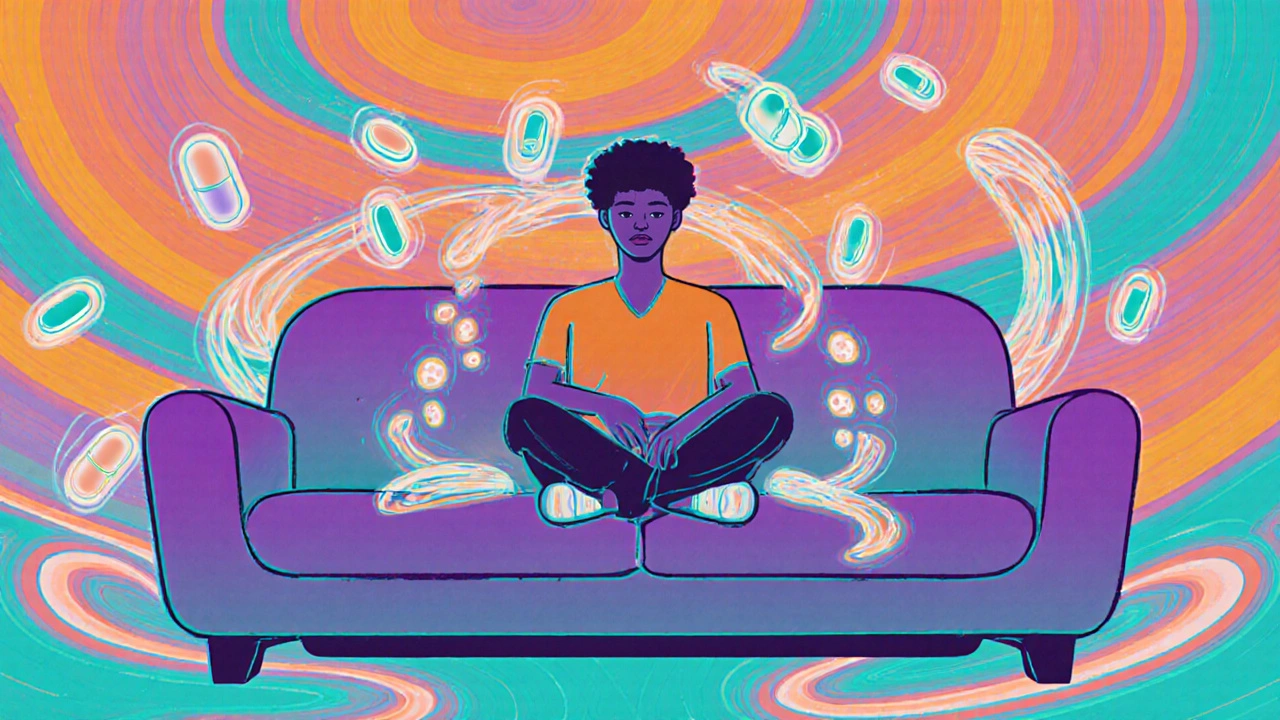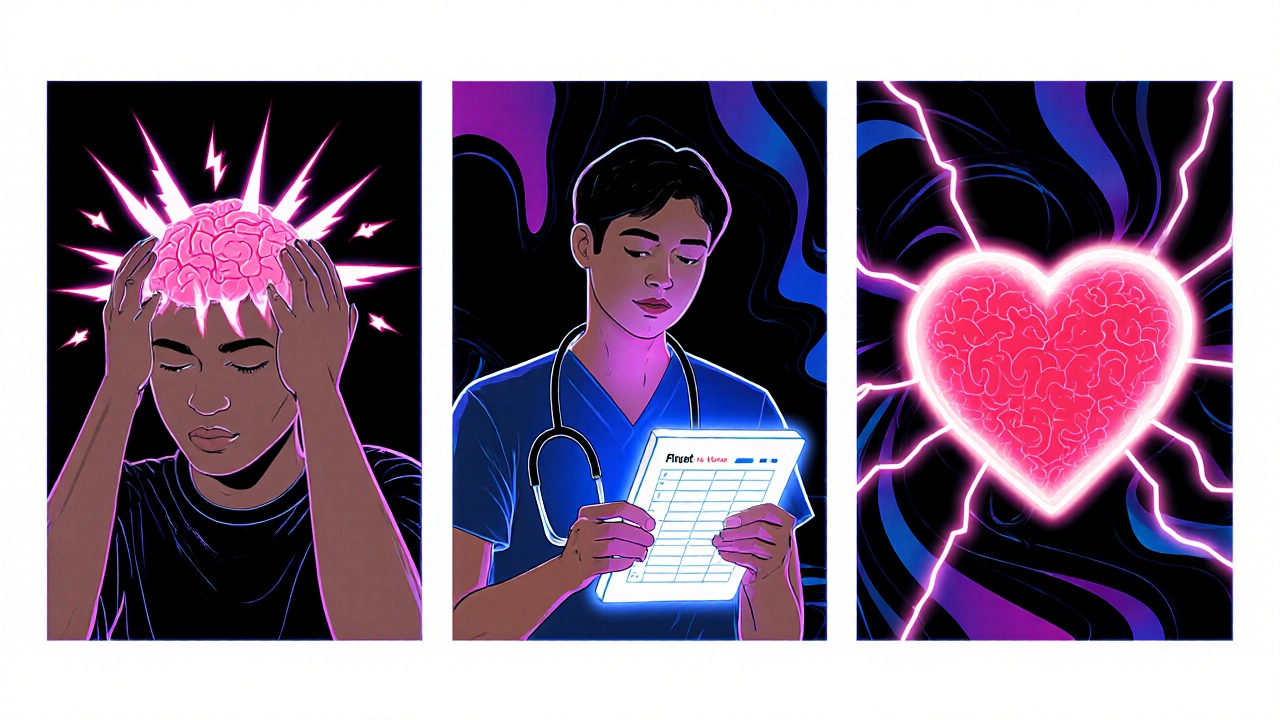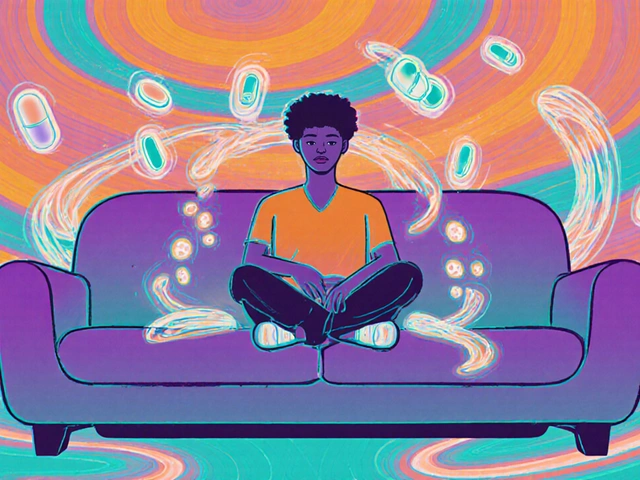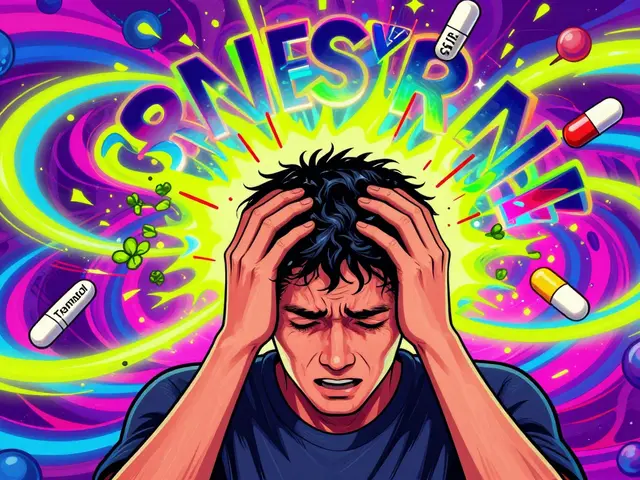
Drug Holiday Safety Checker
This tool helps determine if a planned medication break might be appropriate for your condition. Always consult your doctor before making any changes to your medication.
Check Your Medication Safety
Stopping your medication might sound like a bad idea-until you realize millions of people do it on purpose, and with doctor approval. A drug holiday isn’t skipping pills because you feel fine or forgot your bottle. It’s a planned, temporary pause in treatment, carefully timed and monitored to reduce side effects, reset your body’s response, or improve quality of life. For some, it’s the only way to regain intimacy, sleep better, or stop feeling like a zombie. For others, it’s a dangerous gamble. The difference? Medical supervision.
Why Would Anyone Stop Taking Their Medicine?
People don’t take drug holidays because they want to feel worse. They do it because they’re already feeling worse from the treatment itself. Long-term use of antidepressants like fluoxetine (Prozac) or sertraline (Zoloft) can lead to sexual dysfunction in up to 70% of users. Stimulants for ADHD-like Adderall or Ritalin-can stunt growth in children or cause appetite loss that lasts for months. Some people on Parkinson’s meds report uncontrollable movements that make eating or walking unbearable. These aren’t rare side effects. They’re common enough that doctors sometimes suggest a break. The goal isn’t to cure the condition. It’s to give your body space to recover. For example, taking a weekend break from an SSRI might help restore sexual function without triggering a relapse. Why? Because fluoxetine has a long half-life-meaning it sticks around in your system for days. A 48-hour pause won’t drop your blood levels fast enough to cause withdrawal, but it’s long enough for your brain’s receptors to reset. That’s the sweet spot: enough time to feel better, not enough to fall apart.Not All Medications Are Created Equal
You can’t treat every drug the same way. The science behind drug holidays depends heavily on pharmacokinetics-how your body absorbs, uses, and gets rid of a drug. Half-life matters. A lot. Take paroxetine (Paxil). It leaves your system in about 21 hours. If you skip a dose, your serotonin levels drop fast. That’s when you get brain zaps, dizziness, nausea-the whole withdrawal package. Not safe for weekend breaks. Now compare that to fluoxetine. It sticks around for 4 to 6 days. That means even if you miss two days, your body still has enough of it to stay stable. That’s why weekend drug holidays work for some SSRIs and not others. Same goes for ADHD meds. Methylphenidate (Ritalin) lasts 3-8 hours. Amphetamine-based drugs like Adderall last 4-12 hours. If you stop them on Friday night, your child might be hyper, impulsive, or emotionally volatile by Saturday morning. That’s not a vacation-it’s chaos. And then there are the drugs where skipping a dose can kill you. Beta-blockers for heart conditions. Anticonvulsants for epilepsy. Corticosteroids like prednisone. Abruptly stopping these can trigger heart attacks, seizures, or adrenal crisis. No exceptions. No weekends off. No "I’ll just take it tomorrow."Where Drug Holidays Actually Work
The best evidence for drug holidays comes from psychiatry. The Journal of Sexual Medicine found that 65% of people on SSRIs saw improvement in sexual side effects after a 48-hour weekend break. No drop in mood. No increase in anxiety. Just better intimacy. In ADHD, summer breaks are common-but not because they’re ideal. They’re common because parents and schools want kids to be "normal" during vacation. But the Child Mind Institute found that 78% of children show clear behavioral regression during these breaks. They argue more with siblings. They get into fights at camp. They forget safety rules. One mother reported her son had three ER visits over summer because he ran into traffic without looking. That’s not freedom. That’s risk. There’s one exception: growth delay. About 15-20% of children on long-term stimulants grow slower than expected. A 6-12 week summer break can help them catch up. But even then, doctors track height and weight weekly. And they restart meds before school begins. For depression, the data is mixed. A 2020 study showed that patients with stable, long-term remission (at least 6 months) could safely take a 3-7 day break. But those with two or more past episodes? 33% relapsed within two weeks. That’s why psychiatrists don’t recommend it unless you’ve been rock-solid for years.
The Dark Side: When Breaks Backfire
The most dangerous drug holidays aren’t the ones doctors plan. They’re the ones patients decide on their own. Reddit threads are full of stories like this: "I stopped my antidepressant because I was tired of feeling numb. Two days later, I couldn’t get out of bed. I thought I was having a panic attack. Turns out, it was withdrawal." Drugs.com forums report 41% of users experience withdrawal symptoms after unsupervised breaks. Brain zaps. Insomnia. Flu-like symptoms. Mood crashes. Some people think they’re fine after skipping a few pills. Then they wake up feeling like they’re drowning in their own thoughts. HIV treatment used to be a hotspot for drug holidays. In the late 90s, doctors thought giving the immune system a rest might help. Then came the SMART trial-5,472 patients across 33 countries. Those who took breaks had a 50% higher chance of getting opportunistic infections and a 64% higher risk of heart problems. The trial was stopped early because it was too dangerous. Parkinson’s patients in the 1980s took long breaks to "reset" dopamine receptors. The result? Severe tremors, freezing episodes, and 22% more hospitalizations. Today, that approach is abandoned.How to Do a Drug Holiday Right
If you’re considering a break, here’s how to do it safely:- Wait until you’re stable. Don’t try this if you’ve had a recent episode or adjustment. The American Psychiatric Association recommends at least 6 months of consistent symptom control before even discussing a break.
- Track your symptoms. For 4-8 weeks before the break, write down your mood, sleep, energy, side effects. Use a simple app or notebook. This gives you baseline data to compare against.
- Know your drug’s half-life. Is it short (under 12 hours)? Then don’t skip days. Is it long (over 48 hours)? Then a weekend might be okay-only if your doctor says so.
- Plan the duration. Weekend breaks (48-72 hours) are safest for SSRIs. ADHD breaks should be limited to summer, no longer than 8-12 weeks. Never go beyond what your doctor recommends.
- Set clear return triggers. What makes you restart? If your child starts losing focus at camp? If your anxiety spikes? If you can’t sleep for three nights? Write it down. Stick to it.
- Use a taper if needed. For some meds, going cold turkey is risky. Your doctor might suggest reducing your dose by 25% per week before stopping completely.
- Get emergency instructions. The FDA requires medication guides to include withdrawal signs. Make sure you have them. Know who to call if things go wrong.
What Your Doctor Should Do
A good doctor doesn’t just say "yes" or "no." They help you weigh the trade-offs. They’ll ask: What side effect are you trying to fix? How long has it been going on? Have you tried other fixes-like lowering the dose or switching meds? They’ll check your history: Have you relapsed before? How many episodes? How quickly did symptoms return? They’ll set up monitoring: Weekly check-ins. Symptom logs. Emergency contact. Follow-up within 72 hours after restarting. And they’ll document everything. The FDA requires written protocols for any planned interruption. That’s not bureaucracy-it’s safety.
The Real Cost of Skipping
There’s a hidden cost to drug holidays that no one talks about: trust. When you stop a medication without a plan, you start to doubt your treatment. "Maybe I don’t need this." "Maybe I’m just weak." "Maybe I can handle it on my own." That’s dangerous thinking. Medications for mental health, ADHD, and chronic conditions aren’t optional. They’re tools. Like glasses for vision or insulin for diabetes. Taking a break doesn’t mean you’re stronger. It means you’re risking your stability. On the flip side, when done right, a drug holiday can restore your sense of control. One user on PatientsLikeMe said, "Two days off Prozac brought back my sex life. I didn’t lose my mind. I just got me back." That’s the goal-not to stop the medicine, but to make it work better for you.What’s Changing Now
The future of drug holidays isn’t about guesswork. It’s about precision. In 2023, the FDA approved a new extended-release form of bupropion designed with built-in "holiday windows"-a way to naturally reduce daily dose on weekends without breaking the treatment chain. The NIH is running the SPRINT trial, testing personalized drug holidays using genetic testing. Some people metabolize meds faster. Others are more sensitive. Your DNA might tell your doctor whether you’re a candidate for a break-or if you’re better off staying on. Electronic health records (Epic, Cerner) now track medication holidays automatically. If you haven’t filled your prescription in 30 days, your doctor gets a flag. That’s not surveillance. It’s prevention. And telehealth companies like Done and Cerebral are seeing 40% year-over-year growth in consultations for structured treatment interruptions. People want control. But they don’t want to do it alone.Final Thought: It’s Not About Skipping. It’s About Managing.
A drug holiday isn’t a vacation from your illness. It’s a strategic pause in your treatment. Done right, it can improve your life. Done wrong, it can undo years of progress. If you’re tired of side effects, talk to your doctor. Not your friend. Not your Reddit thread. Your doctor. There’s no shame in needing a break. There’s only danger in taking one without a plan.Can I take a drug holiday on my own if I feel fine?
No. Even if you feel fine, stopping medication without medical supervision can trigger withdrawal symptoms, relapse, or dangerous rebound effects. Conditions like depression, ADHD, epilepsy, and heart disease require consistent chemical balance. What feels like "feeling fine" may actually be your body adapting to the drug-not recovering from it. Always consult your doctor before making any changes.
Which antidepressants are safest for weekend drug holidays?
Fluoxetine (Prozac) is the most commonly used SSRI for weekend breaks because of its long half-life (4-6 days), which helps maintain stable blood levels even after a 48-72 hour pause. Sertraline (Zoloft) and escitalopram (Lexapro) are less ideal due to shorter half-lives and higher withdrawal risk. Paroxetine (Paxil) should never be used for weekend breaks-it leaves your system too quickly. Always confirm with your prescriber before attempting any break.
Are drug holidays safe for children with ADHD?
Summer breaks are sometimes considered for children with ADHD who experience growth delays, but they come with serious risks. Studies show 78% of children experience behavioral regression during medication-free periods, including increased impulsivity, emotional outbursts, and accidents. The American Academy of Child and Adolescent Psychiatry warns of a 45% rise in accident rates during these breaks. If a break is used, it should be limited to 6-12 weeks, closely monitored, and restarted before school resumes.
What are the warning signs I should restart my medication?
Signs you need to restart include: return of original symptoms (depression, anxiety, inattention), extreme irritability, insomnia, brain zaps, dizziness, racing thoughts, or loss of impulse control. For children, watch for aggression, poor school performance, or risky behavior. For adults, watch for social withdrawal, inability to focus at work, or emotional numbness. Have a written plan with your doctor before starting a break so you know exactly when to restart.
Do drug holidays help with medication tolerance?
Yes, in some cases. Long-term use of stimulants or certain antidepressants can lead to receptor downregulation, where your body becomes less responsive. A planned break can help reset sensitivity. However, this only works with specific drugs and under supervision. For example, some psychiatrists use short breaks for ADHD meds to restore appetite or sleep. But tolerance doesn’t always mean you need a break-sometimes a dose adjustment is safer.
Why are drug holidays discouraged for HIV and Parkinson’s patients?
For HIV, the SMART trial proved that treatment interruptions led to 50% more opportunistic infections and 64% more heart problems. For Parkinson’s, past attempts to reset dopamine receptors caused severe symptom spikes, increased hospitalizations, and dangerous motor fluctuations. Both conditions require continuous, stable drug levels to prevent irreversible damage. Unlike depression or ADHD, these diseases don’t have "off days"-the body deteriorates rapidly without consistent treatment.
Can I use a drug holiday to avoid side effects long-term?
No. Drug holidays are meant to be temporary, targeted interventions-not a long-term strategy. Relying on breaks to manage side effects often leads to unstable treatment, increased relapse risk, and worsening symptoms over time. If side effects are persistent, talk to your doctor about switching medications, lowering your dose, or adding an adjunct treatment. A break should be a tool, not a crutch.
How do I know if my doctor is open to discussing drug holidays?
A doctor who’s open to drug holidays will ask detailed questions about your side effects, track your symptoms over time, and offer evidence-based options-not just say yes or no. They’ll explain the risks and benefits, provide written guidelines, and schedule follow-ups. If they dismiss your concerns or refuse to discuss alternatives, it may be time to seek a second opinion from a specialist in psychopharmacology or medication management.
Structured drug holidays are not for everyone. But for the right person, at the right time, with the right plan-they can make a real difference. Don’t guess. Don’t risk. Talk to your doctor.



Fluoxetine weekend breaks actually work if you’re stable. My doc approved it and my sex life came back without the mood crash. No drama.
Look I’m Irish and we don’t do ‘medication schedules’ like some corporate wellness app but honestly this post nailed it. My cousin did a ‘drug holiday’ off his antidepressant because he ‘felt fine’ and ended up in A&E with brain zaps and crying into a bowl of cornflakes. Don’t be that guy. Talk to your doc. Even if they’re boring. Even if you think they don’t get it. They’ve seen 300 versions of you and they still know more than Reddit.
SSRI weekend breaks = pharmacokinetic sweet spot. Half-life >48h = safe window. Paroxetine? Nope. Don’t even think it. Track symptoms. Document. Restart trigger = non-negotiable. This isn’t yoga, it’s neurochemistry.
I used to think meds were just chemical crutches until I realized they were like glasses for my brain. I didn’t need to stop seeing clearly just because I felt like it. Sometimes the thing that helps you see is the thing you hate wearing. Funny how that works.
My kid’s on Ritalin. Summer break was a disaster. He ran into the street twice. One time he tried to high-five a squirrel. I’m not doing that again. Doc said 8 weeks max. We’re done.
People act like drug holidays are some rebellious flex but if you’re not under supervision you’re not being brave you’re being reckless. I’ve seen people go from ‘I’m fine’ to ‘I can’t get out of bed’ in 48 hours. It’s not a vibe. It’s a medical protocol. Respect the science.
It is imperative to emphasize that medication management must be conducted under the guidance of qualified healthcare professionals. Self-initiated interruptions may lead to adverse outcomes that are both clinically significant and potentially life-threatening. A structured, evidence-based approach remains the gold standard.
My therapist said if I felt like I needed a break, we’d make a plan together. We tracked my sleep, mood, and libido for two months before even talking about it. When I did the weekend thing, I had a checklist: if I felt anxious for 2 days straight or couldn’t focus at work, I restart. It worked. I didn’t feel like a zombie anymore. And I didn’t lose my mind. Win-win.
Prozac weekend break = life changer 🙌 My doc said yes, I tracked everything, and now I’m back on full dose but I still do it every other weekend. No brain zaps. No guilt. Just me again. Also I’m not a zombie anymore. 🤓
My dad’s on blood pressure meds and he tried skipping a few days because he didn’t like the dry cough. Ended up in the hospital with a spike. Never again. Some meds you don’t play with. Even if you feel fine. Trust the science, not your gut.
What’s wild is how much we’ve learned about half-lives and receptor sensitivity since the 90s. The SMART trial was a wake-up call. And now with genetic testing in trials like SPRINT, we’re moving toward hyper-personalized breaks. This isn’t just about skipping pills anymore. It’s about precision medicine. The future’s here, and it’s not random.
Why do we even let people take meds? Just let them suffer and build character. America’s too soft. If you can’t handle your brain chemistry, maybe you shouldn’t be allowed to drive.